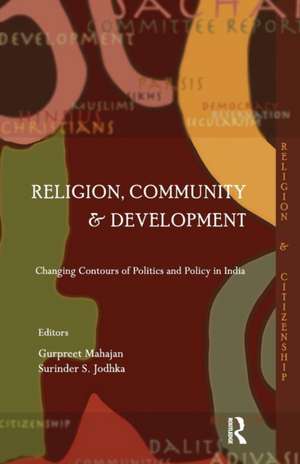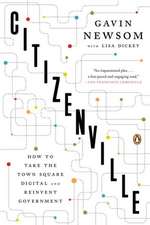Religion, Community and Development: Changing Contours of Politics and Policy in India: Religion and Citizenship
Editat de Gurpreet Mahajan, Surinder S. Jodhkaen Limba Engleză Paperback – 21 ian 2016
This volume focuses on this shift in public policy. The articles in this collection examine the nature and implications of this new approach to the Indian social reality. Taking a close look at the findings of the Sachar Committee Report (SCR) they highlight the challenges posed by inter-community comparisons. At another level the articles supplement the debate initiated by the SCR by constructing a profile of religious communities in India so as to factor in their concerns of development into the present discourse and to nuance and modify the simple indicators to which development is often reduced. As most religious communities are themselves engaged in development-related activities the volume also examines some of these initiatives in order to see what development connotes to the members themselves and what receives attention by the community.
Students of social sciences and development studies as well as those dealing with issues of marginalization will find this collection an invaluable resource for understanding contemporary India and for undertaking further theoretical and empirical research.
| Toate formatele și edițiile | Preț | Express |
|---|---|---|
| Paperback (1) | 444.62 lei 6-8 săpt. | |
| Taylor & Francis – 21 ian 2016 | 444.62 lei 6-8 săpt. | |
| Hardback (1) | 1012.34 lei 6-8 săpt. | |
| Taylor & Francis – 2 iun 2010 | 1012.34 lei 6-8 săpt. |
Preț: 444.62 lei
Nou
Puncte Express: 667
Preț estimativ în valută:
85.08€ • 88.83$ • 70.41£
85.08€ • 88.83$ • 70.41£
Carte tipărită la comandă
Livrare economică 04-18 aprilie
Preluare comenzi: 021 569.72.76
Specificații
ISBN-13: 9781138664890
ISBN-10: 1138664898
Pagini: 348
Dimensiuni: 138 x 216 x 19 mm
Greutate: 0.34 kg
Ediția:1
Editura: Taylor & Francis
Colecția Routledge India
Seria Religion and Citizenship
Locul publicării:Oxford, United Kingdom
ISBN-10: 1138664898
Pagini: 348
Dimensiuni: 138 x 216 x 19 mm
Greutate: 0.34 kg
Ediția:1
Editura: Taylor & Francis
Colecția Routledge India
Seria Religion and Citizenship
Locul publicării:Oxford, United Kingdom
Public țintă
PostgraduateCuprins
List of Abbreviations Preface and Acknowledgements 1. Religion, Community and Development Gurpreet Mahajan 2. Religion and Indian Politics: Changing Perspectives D.L.Sheth 3. Group Equality and the Public Sphere: The Sachar Committee Report and Multiculturalism in India Amir Ali 4. Hindutva’s Discourse on Development Pralay Kanungo 5. Seva, sangathanas and gurus: Service and the Making of the Hindu nation Sujata Patel 6. Development as Liberation: An Indian Christian Perspective Rudolf C. Heredia 7. Indian Christians: Trajectories of Development Rowena Robinson 8. Religious Identities and Discourses of Development: The Sikhs in Contemporary Times Surinder S. Jodhka 9. A Long-Term View of Contemporary Muslim Situation in India Javeed Alam 10. Between Identity and Equity: An Agenda for Affirmative Action Tanweer Fazal 11. Struggle for the Margin or from the Margin Gopal Guru 12. Literacy, Education and Gender Gap among Socio-religious Groups Ravinder Kaur 13. Cultural Rights of Minorities during Constitution-making: A Re-reading Rochana Bajpai 14. The Goan Muslim: Presence through Invisibility V Sri Ranjani Glossary Index
Descriere
By making religious community a relevant category for discussing development deficit, the Sachar Committee Report (2007) initiated a new political discourse in India. This book examines its findings and highlights the implications of a new political discourse.

















